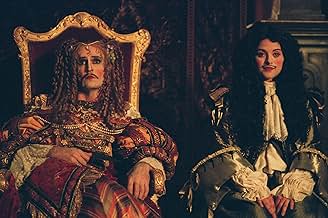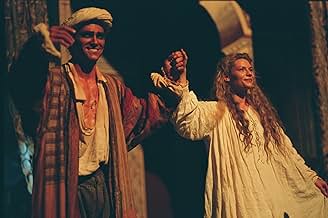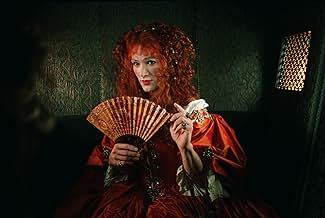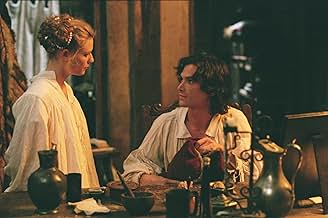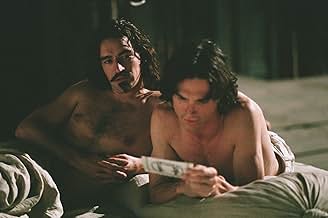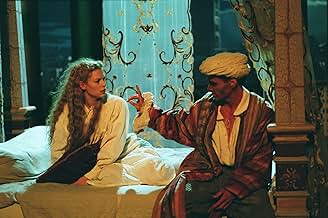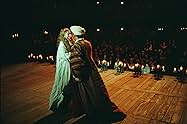Ajouter une intrigue dans votre langueA female theatre dresser creates a stir and sparks a revolution in seventeenth century London theatre by playing Desdemona in Othello. But what will become of the male actor she once worked ... Tout lireA female theatre dresser creates a stir and sparks a revolution in seventeenth century London theatre by playing Desdemona in Othello. But what will become of the male actor she once worked for and eventually replaced?A female theatre dresser creates a stir and sparks a revolution in seventeenth century London theatre by playing Desdemona in Othello. But what will become of the male actor she once worked for and eventually replaced?
- Réalisation
- Scénario
- Casting principal
- Récompenses
- 4 victoires et 1 nomination au total
Avis à la une
This movie gives us a glimpse of how theatre functioned in England up to the times of Charles II. The female roles of all plays were portrayed by male actors. The school of acting in that era was an artificial one where actors relied in gestures and affectations that would be laughable today in a serious drama, but that was the way it was the accepted Method then, nothing to do with Stanivslaski, or Strassberg.
The leading figure of that theatrical world was Ned Keynaston, who was the most famous Desdemona of his time. There must have been a lot of gay men that were attracted to that world, as was the case with Mr. Keynaston, who might have been bisexual, although that comes as a secondary subplot. This actor is greatly admired by all, including the dressing assistant, Maria. This girl loved to be in the theatre, but could not, because only men were allowed. So instead, she goes to a second rate company that puts on plays in a pub and emerges as Margaret Hughes, an actress in her own right who will challenge Keynaston's Desdemona and makes that role, her signature role as well.
Claire Danes, as Maria, or Margaret Hughes, has never been better! She shines as the girl whose ambition is to be on stage. She is wonderful in the part. Ned, played with gusto by Billy Crudup, shows an unexpected range, although he has done theatre extensively. Both of these actors takes us back to London and make us believe that what we are watching.
A glorious English cast behind the two American principals are gathered to play effortlessly the theatrical figures of the time, and also the King and his court. Ruper Everett, as King Charles II, is hilarious. The scene in which he plays in drag with his mistress, Nell Gwynn, is one of the best things of the movie. Also, Richard Griffith, as lecherous Sir Charles Sedley, gives a stellar performance. Ben Chaplin, as the Duke of Buckingham, reveals the ambiguity of the men that were attracted to those early thespians.
Thoroughly enjoyable because of Richard Eyre's direction and eye for detail.
It tells the tale of Ned (Billy Crudup), a young actor who specialises in portraying women on stage. In a world where only men are allowed to tread the boards, Ned's "Desdemona" (from Shakespeare's Othello) is the closest thing 17th century audiences get to femininity in theatre. However, a young upstart in the form of Maria (played by Clare Danes) wants to change all that. She has a passion for drama and unfortunately the bisexual Ned. With the help of King Charles II (Rupert Everett), she may just get her wish, changing theatre forever, and hopefully pick up Ned on the way.
When thinking of the themes of the film, many people dismiss it as a clone of Shakespeare in Love. This is unfair- the film is more thought provoking, substantial and better acted than the aforementioned Oscar snaffler. It explores themes of sexuality and gender with insight and intelligence as well as telling (and, in fact enthralling us with) a love story. As previously referred to, the acting is exceptional, especially the two leads (Danes and Crudup) who shine. The supporting cast is strong too, with Richard Griffiths as a heterosexual prequel to his role in Withnail and I, Tom Wilkinson brimming with quiet intensity as Betterton and Everett hamming it up wonderfully as the King.
Even if it does end on a slightly trite note (not to give too much away, but its' "birth of method acting" shtick irritates), Stage Beauty is a funny, heart-warming and occasionally quite cerebral meditation on love and art. What more could any theatre, or film lover for that matter, want? And don't say Shakespeare In Love!
"Stage Beauty" is set in the world of seventeenth-century Restoration theatre, but the stage serves as a microcosm for life itself, and the roles played by the actors before the public mirror the roles they play in their private lives. The question is, do they create their roles, or do their roles create them?
Ned Kynaston (Billy Crudup) is an actor who takes on women's roles, since real women are not permitted to do so. He has been thoroughly trained and schooled in the then highly stylized technique of portraying women -- to such an extent that any trace of masculinity seems to have been drummed out of him.
His dresser Maria (Clare Danes) yearns to be an actress herself, but is prevented from doing so by the narrow conventions of Puritan England -- until Charles II is restored to the throne and decrees that, henceforth, real women shall play women's roles on the stage. A whole new world opens up for Maria, but it looks like curtains for Ned.
What happens next is pure anachronism: Ned and Maria are able to rise above the limitations and constraints of their era. Not only do they transcend their gender or sex roles, but they overcome their classical training and, in effect, engage in Method acting, a technique still three hundred years away in the far-distant future. When he teaches Maria how to break the mold and play Othello's Desdemona in a whole new, natural way, Ned becomes a seventeenth-century Stanislavsky.
But, by George, it works. Their performance of the celebrated death scene from "Othello" sends shock waves through an audience accustomed to pantomime and exaggerated gestures -- and it electrifies us as well.
Not since Joseph Fiennes and Gwyneth Paltrow in "Shakespeare in Love" have an actor and actress so shimmered and shone simultaneously on stage and screen. One hopes that Billy Crudup and Clare Danes will be remembered for their luminous performances at the 2005 Academy Awards.
Le saviez-vous
- AnecdotesClaire Danes and Billy Crudup became a couple after the filming of this movie. Crudup left his long-time girlfriend Mary-Louise Parker for Danes.
- GaffesNed Kynaston, age 20-something, says that he's been playing women on stage for half his life, since he was a child. But at the royal banquet, the King says that the theatres have only recently reopened after an 18-year shutdown caused by the Puritan takeover.
- Citations
King Charles II: Why shouldn't we have women on stage? After all, the French have been doing it for years.
Sir Edward Hyde: Whenever we're about to do something truly horrible, we always say that the French have been doing it for years.
Meilleurs choix
- How long is Stage Beauty?Alimenté par Alexa
Détails
- Date de sortie
- Pays d’origine
- Sites officiels
- Langue
- Aussi connu sous le nom de
- Compleat Female Stage Beauty
- Lieux de tournage
- Sociétés de production
- Voir plus de crédits d'entreprise sur IMDbPro
Box-office
- Montant brut aux États-Unis et au Canada
- 782 383 $US
- Week-end de sortie aux États-Unis et au Canada
- 38 654 $US
- 10 oct. 2004
- Montant brut mondial
- 2 307 092 $US
- Durée
- 1h 46min(106 min)
- Mixage
- Rapport de forme
- 2.35 : 1



